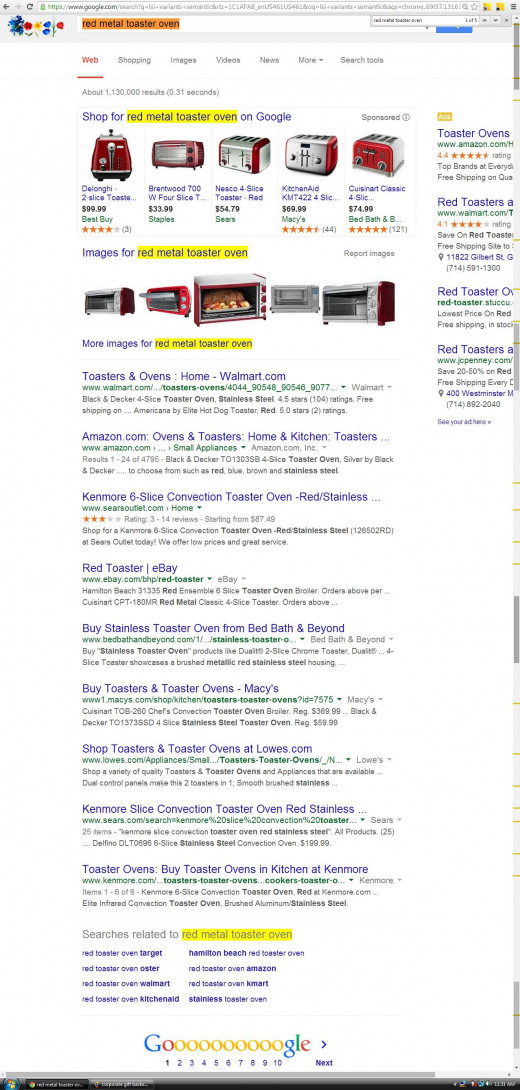Impact of LSI on Long-Tail Keywords in Search: Relevance to SEO?
Less Relevant, Funneled Searches in Google?
Noticing Less Relevance While Searching in Google?
Has Latent Search Indexing Increased Relevance or Ruined It?
I have to say that Google's search engine has really been annoying me lately with all the focus on synonyms, semantic variants, and basically wanting to suggest that it knows what you really want better than you do with your own tiny human brain.
Frankly, I am sick of having to quote the most important terms in my search just to get something halfway relevant. Of course, I have to waste my time playing musical chairs with it because quoting an exact term often doesn't get enough results to find the best pages.
This Isn't Just About a Broad vs Exact Match
Now this isn't just a complete failure of finding an exact type of match. If I need one precise phrase only, I already know I can put quotes around it to get that precise order of keywords exactly.
This is about how there should be a happy medium between allowing a bit of flexibility in word ordering and some synonyms, without playing fast and lose by switching up everything however they are in the mood to do with a given query.
By expanding their database of possibly related and semantically similar words, Google has created an environment of finding such broad matches that it starts to impact the actual relevance (at least in my opinion).
There are often situations where part of the search term may be flexible (such as the exact order or wording or some very similar synonyms) when you are browsing for a result, but the problem now is that it seems the algorithms behind the searching have decided EVERY term is flexible to some degree.
Perhaps this issue is going to be addressed in the future as the LSI database grows and more data is gathered to analyze exactly which terms are more flexible than others.
However, for now, navigating to find what you really are looking for can be very frustrating.
Want an example? See below.
LSI Search on Google for Red Metal Toaster Oven

Notice That There Wasn't a Single Exact Match?
There is not a single exact match!
It just doesn't make sense to me that there shouldn't be at least a couple results that are matching the term exactly, or at least several that recognize the specific term "metal".
I mean, sure, offer some variety, but let's assume the user isn't a complete moron when making their search and chooses their key phrases, please.
Now, sure, it is likely the majority of people are fine if "stainless steel" replaces "metal" semantically for toaster oven queries in general, but what about when they particularly didn't want stainless steel?
What about the two results that ignore "red" completely?
Analyzing the Semantic Variants
The keyword "red" was considered to be a fairly exact search term by the engine's LSI algorithm, apparently, as it showed up in 8 of the 10 results. Of course, I would think most people are actually closer to 100% sure they want the color they asked for instead of something else than 80% sure, but that's another matter.
Unsurprisingly, both keywords "toaster" and "oven" showed up in all 10 results.
The most annoying aspect, though, is that the term "metal" only showed up in 1 out of 10 results.
Of course, they were kind enough to allow the term "metallic" show up once also, but probably only because the full phrase was "metallic red stainless steel".
They sure are positive that any type of metal you want with your toaster oven must be stainless steel.
To be fair, with this specific example, it is likely that this works for a majority of people's needs.
However, I am coming across more and more searches where these sorts of changes and substitutions are semantically changing words so much that it causes me to have to dig through pages of results to find what I actually need (or makes me have to search with quotes in various positions).
I Have to Run so Many Variations, Google Thinks I'm a Bot
So, I am constantly searching and researching, over and over, until I either get it right or Google starts making me type in letters to prove I'm human because it can't believe I need so many searches.
Well, I can't believe I need so many searches to find things, either, Google, so at least we have that in common.
Do you think I like having to mess around trying to quote different parts of my search different ways just to find the really relevant results?
Sometimes specifics really matter. For example, if I ask for "ideas" related to a particular topic, I am not asking to be sent directly to product pages.
And yet...
Where Have the Exact Matches Gone?

So Just How Badly Did Google Ignore Us?
Given that the most important distinction is the key term "ideas", they ignored what we wanted pretty hard.
Only 1 out of 10 results had the word "ideas" at all, and this page was an obvious brand name commercial site that is going to be giving "ideas" by displaying products, which is probably not the kind of "ideas' a lot of people are wanting.
Doesn't "ideas" likely mean that they may want suggestions on what types of baskets work for different clients, whether employees like baskets with food or spa items more, the best ways to present these gifts, and other such things?
Instead, Google decided to show a bunch of sales sites and completely ignored what I imagine is the likely intent of searching for "ideas".
Now don't get me wrong, almost everyone online is selling something. However, at least some sites will give you some great information with an article or other content that helps to answer your questions first.
Those don't seem to be the sites Google decided you wanted here, though.
Now What Does This Mean for SEO and Long-tail Keywords?
Unfortunately, I can't help but feel that this just about slaughters the old concept of finding a super unique long-tail keyword that has a given amount of competition and being able to build a page to rank for that phrase.
I mean, clearly, the searches are wanting to show you results that aren't that closely matching the exact phrase, so how would anyone rate for that exact keyword phrase if they were specifically designing a site around that?
See what I mean?
I'm pretty sure that that concept just doesn't really work anymore, or, at least, that it won't keep working as the LSI algorithms and databases expand and the search engines learn to replace synonyms and other indications of supposed intent however they choose.
Instead, for ranking a page, it seems to be a better strategy to utilize a lot of semantic varieties and conceptual families or themes of keywords throughout your content.
Of course, actually figuring out which phrases you will be likely to rank for seems to be a total shot in the dark, and this makes it very hard to find particular deep level phrases to build sites around.
Anyone else know how to analyze this these day? I would love to hear from you!
Wait, What Are Long-Tails Again?
SEO Ranking Can Be a Strange, Surprising Thing
By utter and complete chance, I discovered that a forum post I created just the other day was ranking #1 in a pretty wide field of searches.
Out of nowhere, this forum post where I was questioning current long-tail practices since the implementation of latent search indexing jumped to the forefront.
On one search I found I was #1 out of 2.89 million results!
How did this even happen?
I genuinely don't know what random act of chance caused this post to jump in rank within the day like that, but I am doing everything I can to figure out how that happened to implement it with other sites in the future.
I have since created a hub that talks about a very related topic with very similar terminology (LSI, semantic variants, and so on). I am eager to see if the hub gains anywhere near as much traction as my forum post.
Has LSI Killed Long-tail Keyword Effectiveness?








